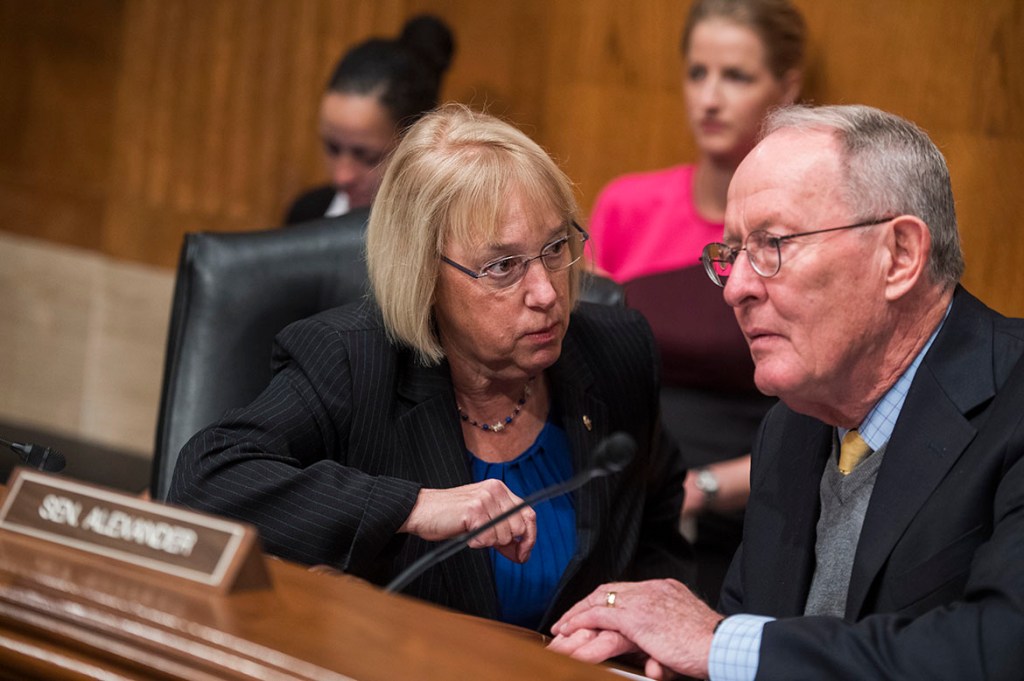After nearly two months of negotiations, key senators said Tuesday they have reached a bipartisan deal on a proposal intended to stabilize the Affordable Care Act’s insurance market, which has been rocked by recent actions by President Donald Trump.
Sens. Lamar Alexander (R-Tenn.) and Patty Murray (D-Wash.), respectively the chairman and the top Democrat of the Senate Health, Education, Labor and Pensions Committee, negotiated the emerging deal. The milestone agreement, they said, would guarantee payment of “cost-sharing reduction” subsidies that help some policyholders with low incomes afford their deductibles and other out-of-pocket costs for two years, 2018 and 2019.
Trump announced last week that he would stop funding the subsidies, which have been the subject of a long-running lawsuit. These subsidies are separate from the tax credit subsidies that help eligible consumers pay for their premiums. Those premium subsidies are not affected by Trump’s action.
Even if it fails to become law, the deal marks a singular achievement that has been almost completely missing in Congress for the past eight years — a bipartisan compromise on how to make the nation’s health insurance system work.
“This is an agreement I am proud to support,” said Murray on the Senate floor, “because of the message it sends about how to get things done.
The proposal — which will require 60 votes to pass the Senate and agreement from a still-dubious House of Representatives — would also restore $110 million in “outreach” funding cut by the Trump administration. That funding would help guide eligible individuals to sign up for coverage on the health insurance exchanges during the open enrollment period that runs from Nov. 1 to Dec. 15.
In exchange for those provisions, urged by Democrats and state officials, Republicans will win some changes to make it easier for states to apply for “waivers” that would let them experiment with alternative ways to provide and subsidize health insurance. The deal would also allow the sale of less comprehensive “catastrophic” plans in the health exchanges. Such plans currently can be sold only to those under age 30.
On the Senate floor Tuesday afternoon, Alexander said, “This agreement avoids chaos. I don’t know a Democrat or a Republican who benefits from chaos.”
Senate Majority Leader Mitch McConnell (R-Ky.) reserved judgment about the deal.
Both parties still have some major disagreements when it comes to health care, Senate Minority Leader Chuck Schumer (D-N.Y.) told reporters Tuesday afternoon, but “I think there’s a growing consensus that in the short term we need stability in the markets. So we’ve achieved stability if this agreement becomes law.”
More than 60 senators have already participated in the meetings that led to the deal, Alexander said on the Senate floor. But the path to passage in the House is uncertain — with many conservatives vehemently opposed to anything that could be construed as helping the law they call “Obamacare” succeed.
Tweeted Rep. Mark Walker (R-N.C.), chairman of the conservative Republican Study Committee, Tuesday: “The GOP should focus on repealing & replacing Obamacare, not trying to save it. This bailout is unacceptable.”
Both Murray and Alexander said Tuesday they were still struggling over language to make sure that if the cost-sharing payments are resumed, insurers would not receive a windfall by keeping both those payments and the higher premiums that many states are allowing in anticipation of the payments being ended.
“We want to make sure that the cost-sharing payments go to the benefit of consumers, not the insurance companies,” Alexander said.
Trump, who as recently as Monday called the cost-sharing subsidies “a payoff” to insurance companies, took credit for the negotiations. “If I didn’t cut the CSR’s, they wouldn’t be meeting,” he said. That was not, in fact, the case. The negotiations had picked up some weeks ago after being called off earlier in September while the Senate tried for one last-ditch repeal vote.
On Friday, White House Budget Director Mick Mulvaney told Politico that the president would not allow a short-term fix, calling a restoration of the cost-sharing reduction funds “corporate welfare and bailouts for the insurance companies.”
But on Tuesday the president hailed the deal. “We think it’s going to not only save money, but give people much better health care with a very, very much smaller premium spike,” he told reporters.







